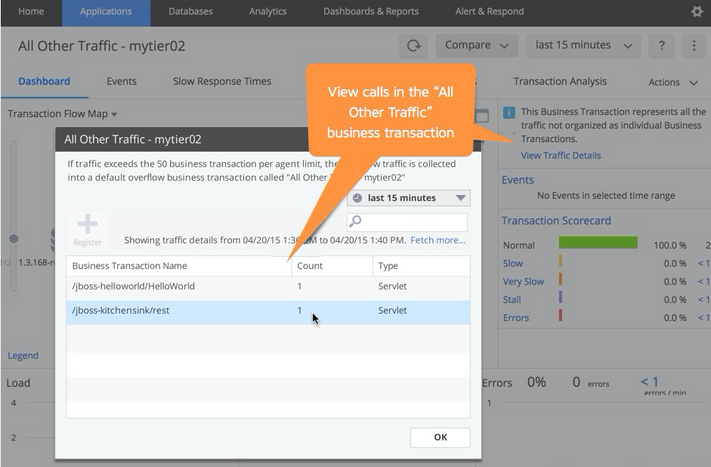- Community Hub
- Forum Q&A
- Business iQ (Analytics)
- Controller (SaaS, On Premise)
- Dashboards
- Dynamic Languages (Node.JS, Python, PHP, C/C++, Webserver Agent)
- End User Monitoring (EUM)
- Infrastructure (Server, Network, Database)
- Java (Java Agent, Installation, JVM, and Controller Installation)
- Licensing (including Trial)
- .NET (Agent, Installation)
- Smart Agent
- General Discussions
- Resources
- Groups
- Idea Exchange
Not a customer? Click the 'Start a free trial' link to begin a 30-day SaaS trial of our product and to join our community.
Existing Cisco AppDynamics customers should click the 'Sign In' button to authenticate to access the community
- Cisco AppDynamics Community
- Resources
- Knowledge Base
- Why aren’t business transactions appearing in the ...
- Subscribe to RSS Feed
- Mark as New
- Mark as Read
- Bookmark
- Subscribe
- Printer Friendly Page
- Report Inappropriate Content
At 6pm PST, the AppDynamics Community will go into read-only mode and after migration is complete, you will be redirected to community.splunk.com.
Read more here
- Article History
- Subscribe to RSS Feed
- Mark as New
- Mark as Read
- Bookmark
- Subscribe
- Printer Friendly Page
- Report Inappropriate Content
on 02-23-2015 03:18 PM - edited on 09-07-2018 01:22 PM by Nina.Wolinsky
Updated 6/15/18
If one or more of your expected business transactions (BTs) are not appearing on the Business Transaction list in your Controller UI, complete the following troubleshooting steps to determine the root cause.
- Do you see any business transactions?
- Has the BT limit been reached?
- Do you need to revise your BT detection configuration?
- Are the application agents reporting?
1. Do you see any business transactions?
Check the Business Transaction list in your Controller UI, which will display only business transactions that have performance data in the selected time range by default. If you are missing data, you may need to modify your filters in case some BTs are hidden by the filter view options: View Business Transactions.
Your application may also be making calls that are not hitting the default supported interceptors. Alternatively, it could be making calls directly to EJB Entry Points or Spring Bean Entry Points, for which we disable auto discovery by default.
2. Has the BT Limit Been Reached?
AppDynamics limits the number of BTs to 50 transactions per agent and 200 transactions per business application. If traffic exceeds the 50 BTs per agent limit, any additionally detected BTs will be captured and aggregated into a virtual business transaction called "All Other Traffic." There is one "All Other Traffic" BT for each tier on which the limit is reached.
Check if the expected BTs have been categorized as “All Other Traffic” by opening the dashboard for the “All Other Traffic - <tier name>” BT and clicking the View Traffic Details link. From here, you can see a list of entry points that were hit by incoming requests after the registration limit was maxed out. If needed, you can move transactions from the All Other Traffic bucket.
3. Do you need to revise your BT detection configuration?
An important part of implementing AppDynamics is customizing your BT detection configuration so you can capture the most relevant transactions for your business. In addition to using automatic transaction discovery rules, you can use custom match rules for more granular control. If customizations aren’t configured properly, you may not be capturing all of your expected BTs. For instructions on customizing detection rules, review the resources below:
- Transaction Detection Rules
- .NET Business Transaction Detection
- Java Business Transaction Detection
- Custom Exclude Rule Examples
4. Are the application agents reporting?
If your agents aren’t reporting business transaction data, there may be a connection issue between your agents and the Controller. Check your agent-to-Controller connections to see if this is the root cause for missing data: Verify agent-controller connection. For additional troubleshooting tips, visit: App Agent Not Reporting.
- Mark as Read
- Mark as New
- Bookmark
- Permalink
- Report Inappropriate Content
In the second point, you say ". From here, you can see a list of entry points that were hit by incoming requests after the registration limit was maxed out. If needed, you can move transactions from the All Other Traffic bucket."
In order to move, do we have to first exclude some other BTs in the same tier?
- Mark as Read
- Mark as New
- Bookmark
- Permalink
- Report Inappropriate Content
What is the node property which defines the limit of business transactions that can be registered against an application?
- Mark as Read
- Mark as New
- Bookmark
- Permalink
- Report Inappropriate Content
Received answer in :
https://community.appdynamics.com/t5/Controller-SaaS-On-Premises/Node-Business-Transaction-Limit-Exp...
There is a default limit of 50 BT's that a node/agent can register and there is a 200 BT limit that a controller can accept.
-Dmaximum.bts.per.application (default=200)
max-business-transactions (agent node level property, default=50)
(But increasing this value is highly discouraged as it creates additional overhead.)
Join us on Feb 26 to explore Splunk AppDynamics deployment strategies, SaaS models, agent rollout plans, and expert best practices.
Register Now
Dive into our Community Blog for the Latest Insights and Updates!
Read the blog here

Thank you! Your submission has been received!
Thank you! Your submission has been received!
Oops! Something went wrong while submitting the form
